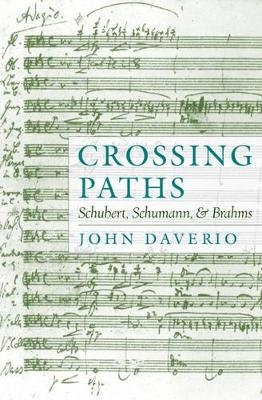
Crossing Paths
Schubert, Schumann, and Brahms
Seiten
2002
Oxford University Press Inc (Verlag)
978-0-19-513296-0 (ISBN)
Oxford University Press Inc (Verlag)
978-0-19-513296-0 (ISBN)
This title explores the connections between art and life in the works of three giants of musical romanticism. He considers topics including Schubert and Schumann's ability to evoke memory in music, the supposed cryptographic practices of Schumann and Brahms, and the allure of the Hungarian Gypsy style for Brahms and others in the Schumann circle.
In Crossing Paths, John Daverio explores the connections between art and life in the works of three giants of musical romanticism. Drawing on contemporary critical theory and a wide variety of nineteenth-century sources, he considers topics including Schubert and Schumann's uncanny ability to evoke memory in music, the supposed cryptographic practices of Schumann and Brahms, and the allure of the Hungarian Gypsy style for Brahms and others in the Schumann circle. The book offers a fresh perspective on the music of these composers, including a comprehensive discussion of the 19th century practice of cryptogtraphy, a debunking of the myth that Schumann and Brahms planted codes for "Clara Schumann" throughout their works, and attention to the late works of Schumann not as evidence of the composer's descent into madness but as inspiration for his successors. Daverio portrays the book's three key players as musical storytellers, each in his own way simulating the structure of lived experience in works of art. As an intimate study of three composers that combines cultural history and literary criticism with deep musicological understanding, Crossing Paths is a rich exploration of memory, the re-creation of artistic tradition, and the value of artistic influence.
In Crossing Paths, John Daverio explores the connections between art and life in the works of three giants of musical romanticism. Drawing on contemporary critical theory and a wide variety of nineteenth-century sources, he considers topics including Schubert and Schumann's uncanny ability to evoke memory in music, the supposed cryptographic practices of Schumann and Brahms, and the allure of the Hungarian Gypsy style for Brahms and others in the Schumann circle. The book offers a fresh perspective on the music of these composers, including a comprehensive discussion of the 19th century practice of cryptogtraphy, a debunking of the myth that Schumann and Brahms planted codes for "Clara Schumann" throughout their works, and attention to the late works of Schumann not as evidence of the composer's descent into madness but as inspiration for his successors. Daverio portrays the book's three key players as musical storytellers, each in his own way simulating the structure of lived experience in works of art. As an intimate study of three composers that combines cultural history and literary criticism with deep musicological understanding, Crossing Paths is a rich exploration of memory, the re-creation of artistic tradition, and the value of artistic influence.
John Daverio was Professor of Music, Director ad interim, and Chairman of the Musicology Department of the School of Music at Boston University.
PART I: SCHUMANN'S ONE AND ONLY SCHUBERT; PART II: UTTERING CLARA IN TONES; PART III: A NOBLE MODEL
| Erscheint lt. Verlag | 14.11.2002 |
|---|---|
| Zusatzinfo | numerous music examples, 2 halftones |
| Verlagsort | New York |
| Sprache | englisch |
| Maße | 160 x 236 mm |
| Gewicht | 621 g |
| Themenwelt | Literatur ► Biografien / Erfahrungsberichte |
| Kunst / Musik / Theater ► Musik ► Klassik / Oper / Musical | |
| Kunst / Musik / Theater ► Musik ► Musiktheorie / Musiklehre | |
| ISBN-10 | 0-19-513296-3 / 0195132963 |
| ISBN-13 | 978-0-19-513296-0 / 9780195132960 |
| Zustand | Neuware |
| Haben Sie eine Frage zum Produkt? |
Mehr entdecken
aus dem Bereich
aus dem Bereich


